My Chat with a Meteorologist

Cash Daniels is a TFK Kid Reporter. He was a 2021 TIME Kid of the Year finalist for his work combating plastic pollution in waterways. Here, he writes about his conversation with meteorologist Ashley Ruiz.
When you think about who’s responsible for a city’s safety, what people come to mind? Police officers, firefighters, emergency response teams. Would you put your local meteorologist in this group? That’s the career Ashley Ruiz chose, and she’s now the first female chief meteorologist in Baton Rouge, Louisiana. Ruiz predicts the weather for her community. In 2020, a tornado hit my hometown of Chattanooga, Tennessee—and, even closer to home, my house. So I know what a lifesaving job this can be.
When I spoke with Ruiz, in October, she said, “Getting out in the community is one of my favorite parts [of the job]. Meeting the families who saw the forecast and were able to get to safety—it’s amazing, knowing I helped make that happen.”

Then there’s what Ruiz considers one of the difficult parts of the job. “Hearing people have been injured, like in a big hurricane, is really hard,” she said. “We try our best to predict the weather as best we can, and we are getting better. But it can always change.”
Ruiz and I talked about how people can learn from new and changing weather patterns. I asked her if they relate to climate change. “Yes,” she told me. “We are absolutely seeing changes in weather, with more-intense and more-frequent storms.” Weather is changing everywhere, as the planet warms. There are more-frequent droughts, stronger storms, and increasing temperature changes. This makes predicting the weather a challenge.
Ruiz always knew she was interested in weather and how it affects the world. But her path to a career in meteorology wasn’t easy. She wants kids to know they should never give up on their education or their dreams. “A lot of girls may be discouraged to work in a male-dominated workforce,” she said. “I, for sure, was. I still get discouraged, but I hope I can help motivate girls, young women, and women in general to keep pushing forward.”
She had another piece of advice: “Even if you struggle with STEM, just keep trying. I struggled so hard with math and wanted to give up. But I kept pushing and working hard, and now I’m the first woman chief meteorologist in the Baton Rouge TV market. I’m proud of that accomplishment.”
“I do believe more girls and women are more involved in STEM [now] versus 10 years ago,” she added. “It seems to be improving, but we still have a lot of work to do.”

